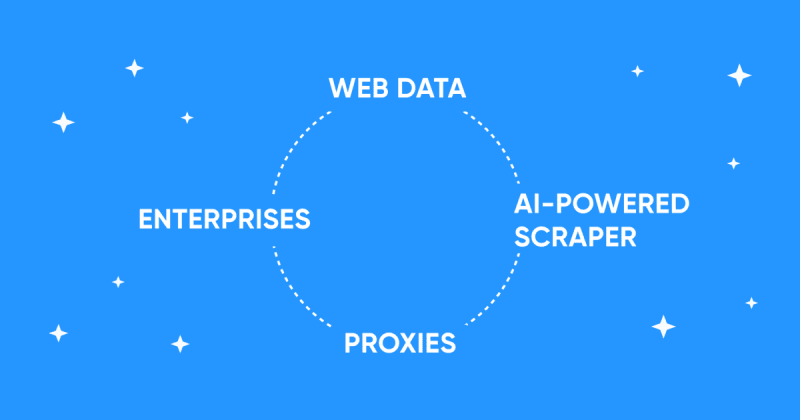
Business data-driven decisions determine development of modern industry. Total amount of the global data analytics market was estimated to be more than $41 billion by the beginning of 2023, according to Precedence Research. Information is collected at scale around the globe, inter alia in China, Italy, Turkey, Austria, Nigeria, UAE and Philippines via proxies for social networks.
Reliable platforms gathering parts of content from the Internet are compatible with AI-based solutions. Hence when one buys dedicated proxies, one gets access to the key component, rotating datacenter proxies, residential and mobile.
Earlier we talked about the history of trusted proxy websites, including Dexodata. Today we will pay attention to their possible future as a part of a web scraping technology.
Why is web data collected with geo targeted proxies?
Acquisition of public data implies thousands of sites to be examined, managed and applied as information sources. Standardized actions are repeated millions of times due to the extent of the procedure. AI-powered algorithms take over the routine, while dedicated proxies one buys maintain safety and steadiness of every connection.
Data retrieval frameworks serve for:
Product design and manufacture
Risks management and forecasts
Marketing strategies based on consumer sentiment
Supply chain optimization
Competitors tracking.
Automated data collection requires market players in Austria and UAE to buy residential and mobile proxies on higher levels, qualitatively and quantitatively.
Web scraping trends
There are three most probable options. These are:
Increasing role of AI-powered web analytics
Tools customization
Data harvesting market expansion
Rotating datacenter proxies and other middlebox solutions will follow these trends. Below we will clarify the role of every item listed.
1. Increasing role of AI-powered web analytics
Artificial Intelligence serves as an improved automation method based on machine learning (ML). Previous algorithm generations deprived of self-educational features were capable of:
Browsing the target page
Locating the information needed
Downloading data
Structuring it.
AI-powered web scrapers do the same and more. But advanced robots also can:
Crawl the Internet for similar sites
Find required classes and types of info
Buy residential and mobile proxies
Use ML-driven proxy management to secure connections
Avoid anti-botting measures
Get access to content via API
Obtain information
Process it
Output info as a structured ready-to-use CSV, JSON or XLS file.
Our blog has already explained the basics of AI-driven web scraping via geo targeted proxies. New models take all mentioned actions without direct external control, on the basis of knowledge obtained during training and utilizing its own further experience. AI-based data acquiring solutions are taught to detect the patterns, recognize the relevant text or media pieces of online content, and extract them.
There is no need to adjust automated scanners for every particular page. AI-enhanced algorithms do it on their own. The result is growing accuracy of data collection with reduced number of mistakes and malfunctions.
Focus on ML requires a lot of examples for training algorithms. Trusted proxy websites provide IP pools in dozens of areas to guarantee the impartiality of further data obtaining models. E.g. Dexodata offers to buy dedicated proxies in China, Italy, Turkey, and in more than hundred countries.
2. Tools customization
AI-based data retrieval solutions perform recurring actions at an increased speed. Especially for cases connected to big data, including feedback from devices pertaining to the Internet of Things (IoT).
Public data acquisition is applied by almost every field of industry, science, mass media or culture. One buys residential rotating proxies in 2023 to carry out the task. Complementing market demands is crucial for the future of web scraping. AI-driven models are becoming more complex and specialized. Enterprises buy residential and mobile proxies in Nigeria, Philippines, etc utilizing them as a part of turnkey solutions for information harvesting.
The challenge software developers face is the launch of a standardized and easily adjustable software at the same time. It must be flexible enough to extract specific info types from different sources no matter what it is: online retail, ratings or job listings. Other demands are high compatibility with proxies and intelligible API interface.
Hands-off approach strengthens the customization trend. Enterprises prefer to obtain ready-to-go databases or delegate the retrieval job to a third-party platform. It is better to buy dedicated proxies from trusted load-resistance platforms.
3. Data harvesting market expansion
Precedent Research predicts the data market will grow three times by 2030. It becomes more and more structured, while new enterprises embrace the necessity of AI-powered web analytics.
AI can be faster than humans in working with unstructured amounts of information, including human speech and written texts. Solutions driven by natural language processing are intended to interpret human language. ChatGPT is a representative of AI able to convert orders to computing code, among others.
Variety of SaaS-services implemented in trusted proxy websites also grows. Business is in need of alternative data analytics. These are rare and previously unpopular data sets, such as:
SEC filings
Mass media sentiments
Product reviews
Weather maps
Medical X-ray and MRI scans, etc.
As you see, the future of scraping information online is closely associated with AI-based solutions despite they are at an early stage of development. Tools customization and significant growth are not the only trends of the data analytics market. Safety concern is also on its rise as do cloud-driven data retrieving solutions.
ML-powered response recognition demands rotating proxies, datacenter, mobile and residential IPs to gather training material and simplify further work.
The status of AI-enhanced automated web scrapers is still discussed. The Computer Fraud and Abuse Act (CFAA) is no longer a legal ground to stop mining public-facing data. However, bot protection solutions on sites may be the obstacle to gather and collect information. The most frequent barriers for successful analytics in 2023 are security programs and limited access, according to FinancesOnline.
Dexodata, as a trusted proxy website with reliable blog and top-tier data obtaining ecosystem, expands the boundaries of internet analytics. Sign up and get a free proxy trial to adjust our IP pools to your business needs.



Top comments (0)